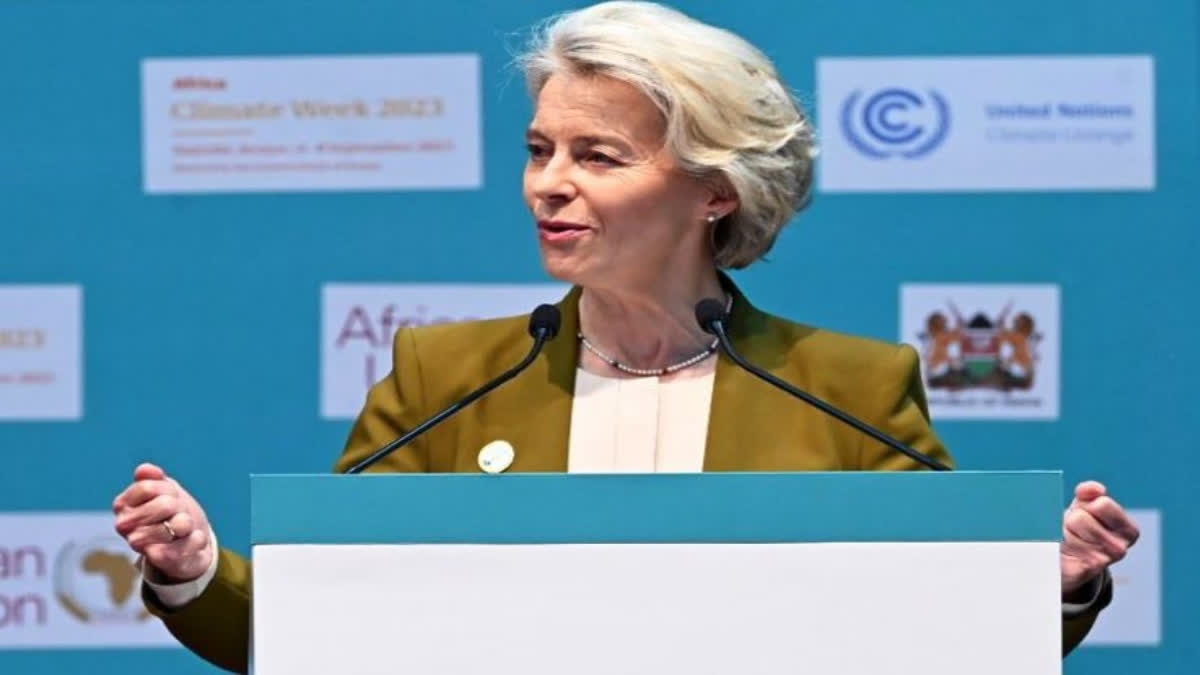New Delhi: In a compelling address during Session III of the G20 summit, titled 'One Future,' European Commission President Ursula von der Leyen emphasized the inevitability of a digital future while highlighting the pressing need for a comprehensive approach to harnessing the potential of artificial intelligence (AI) and investing in digital infrastructure. Her remarks underscored the importance of safeguarding against AI-related risks and promoting responsible technology development on a global scale.
-
The future is digital. I passed two messages to the G20:
— Ursula von der Leyen (@vonderleyen) September 10, 2023 " class="align-text-top noRightClick twitterSection" data="
→ We should establish a framework for safe, responsible AI, with a similar body as the IPCC for climate
→ Digital public infrastructures are an accelerator of growth. They must be trusted, interoperable & open to all
">The future is digital. I passed two messages to the G20:
— Ursula von der Leyen (@vonderleyen) September 10, 2023
→ We should establish a framework for safe, responsible AI, with a similar body as the IPCC for climate
→ Digital public infrastructures are an accelerator of growth. They must be trusted, interoperable & open to allThe future is digital. I passed two messages to the G20:
— Ursula von der Leyen (@vonderleyen) September 10, 2023
→ We should establish a framework for safe, responsible AI, with a similar body as the IPCC for climate
→ Digital public infrastructures are an accelerator of growth. They must be trusted, interoperable & open to all
President von der Leyen began her address by acknowledging the undeniable direction in which the world is heading – towards a digital future. She stressed the significance of focusing on AI and digital infrastructure, recognizing that while AI presents risks, it also presents incredible opportunities. The critical question, she posed, is how to effectively manage the rapid evolution of this transformative technology. She noted that even the pioneers and creators of AI are urging political leaders to establish regulatory frameworks.
Crucially, President von der Leyen proposed the development of a new global framework for AI risks, asserting that Europe, alongside its international partners, should spearhead this initiative. Such a framework, she argued, would serve a dual purpose: safeguarding against systemic societal risks associated with AI while simultaneously encouraging investments in safe and responsible AI systems. Importantly, she stressed the necessity of extending this framework to involve the broader United Nations community.
Drawing an analogy to the Intergovernmental Panel on Climate Change (IPCC), President von der Leyen suggested the creation of a similar body dedicated to AI. This body would be responsible for gathering input from scientists, entrepreneurs, and innovators, who would contribute their expertise on the risks and potential benefits of AI for humanity. In doing so, it would facilitate informed decision-making on the global stage, ensuring that AI development is aligned with ethical principles and societal interests.
President von der Leyen also turned her attention to Digital Public Infrastructures (DPIs), acknowledging their role in propelling emerging economies forward. She commended India for its remarkable success in rolling out DPIs, citing Prime Minister Modi's initiative in this regard. DPIs, she argued, have the potential to be a catalyst for progress, bridging the digital divide and enabling equitable access to digital services.
In conclusion, European Commission President Ursula von der Leyen's address at the G20 summit underlined the imperative of embracing a digital future while responsibly managing the risks associated with AI. Her call for a global framework for AI risks and continued investment in digital infrastructure highlights Europe's commitment to shaping a future that is not only digital but also safe and inclusive for all.



